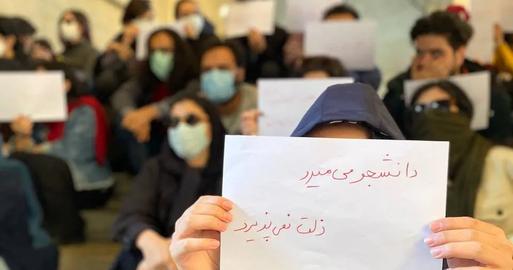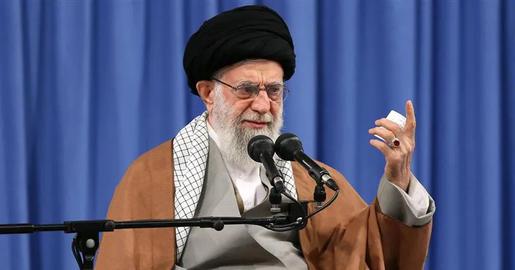Many university students in Tehran continue to defy orders to return to class, insisting that the authorities should first release those arrested during an ongoing wave of nationwide protests demanding more freedoms and women's rights.
Students at the University of Science and Technology started the week on November 26 with a sit-in outside of the Faculty of Engineering.
Others held a rally in solidarity with protesters in western Kurdish cities, where security forces have fired on protesters with heavy weaponry over the past days. Riot police clashed with the demonstrators and closed the gates of the University of Science and Technology.
Students at Amir Kabir University of Technology continued their sit-in in the Faculty of Physics for the eighth consecutive day.
At Sharif University of Technology, students held placards bearing the names of their imprisoned classmates, including Mohammad Mostafaei, Fatemeh Nasser Ranjbar and Reza Fathi.
Students have been at the forefront of protests sparked by the September death of a 22-year-old Kurdish woman, Mahsa Amini, in the custody of Tehran’s morality police. She had been arrested for allegedly breaching the Islamic republic's strict dress code for women.
In defiance of authorities' warnings, many students have refused to attend classes. They are demanding the unconditional release of all arrested students, the prohibition of arrest warrants for the released students, the lifting of recent academic suspensions and the withdrawal of the security forces from campuses.
Social media footage showed male and female students on campuses across Iran eating together, often outside the gender-segregated dining halls that were closed after students tore down the walls dividing men and women.
This year, the International Day for the Elimination of Violence against Women, which is marked on November 25, is “tied to a movement that shouts the slogan 'Women, Life, Freedom," the students at Tehran’s Allameh University wrote in a statement.
"We believe with more emphasis on the role of women in society, and condemn violence against women in any form and at any level," they added.
Security forces have cracked down hard on the protest movement, one of the boldest challenges to Iran’s clerical rulers since the 1979 Islamic Revolution.
More than 410 people, including at least 51 children and 27 women, have been killed in the state crackdown, according to one human rights group. Thousands of people have also been arrested.
At least six have so far been sentenced to death over the demonstrations that have marked one of the boldest challenges to its clerical rulers since the 1979 Islamic Revolution.
visit the accountability section
In this section of Iran Wire, you can contact the officials and launch your campaign for various problems

























comments